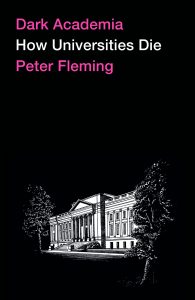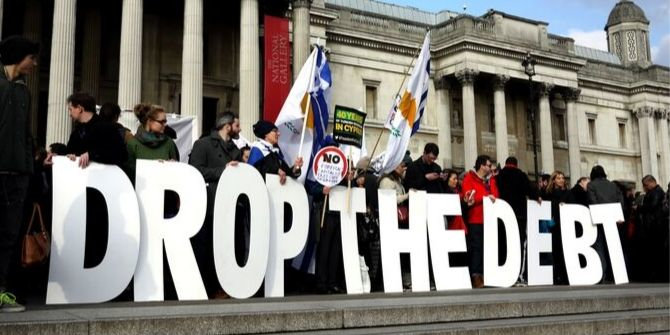In Dark Academia: How Universities Die, Peter Fleming explores the destructive impact of the bureaucratic and neoliberal structures of academia, which have turned universities into toxic workplaces. The book powerfully evokes despair and despondency at the loss of the intellectual environment promised of academics, writes Chelsea Guo, yet she questions whether the traditional academic institution has ever truly been a sanctuary for everyone.
Dark Academia: How Universities Die. Peter Fleming. Pluto Press. 2021.
 To an aspiring academic, Dark Academia: How Universities Die by Peter Fleming reads like an ‘Abandon All Hope, Ye Who Enter Here’ inscription on an ivory doorway to Hell. Despite Fleming’s rather mild tone (except when comparing university management to Adolf Hitler and Joseph Stalin (71, 123)), each page bleeds with the despair, despondency and forlorn yearning for the intellectual environment that was promised of academics, young and old, across the sciences and the humanities alike.
To an aspiring academic, Dark Academia: How Universities Die by Peter Fleming reads like an ‘Abandon All Hope, Ye Who Enter Here’ inscription on an ivory doorway to Hell. Despite Fleming’s rather mild tone (except when comparing university management to Adolf Hitler and Joseph Stalin (71, 123)), each page bleeds with the despair, despondency and forlorn yearning for the intellectual environment that was promised of academics, young and old, across the sciences and the humanities alike.
Throughout the book, Fleming, a seasoned academic himself, recounts the stories of such victims of ‘Dark Academia’. These include Gregory Eells, Director of Counselling and Psychological Services at the University of Pennsylvania, who killed himself in downtown Philadelphia. Thea Hunter, a Columbia University PhD who became a permanent member of the underpaid, uninsured, ‘untenured underclass’ and died of multiple organ failure after being unable to afford medical treatment. Stefan Grimm, a Professor of Toxicology at Imperial College, who related his experience of alleged egregious disrespect from his department’s leadership in a posthumously sent email following his suicide that twice asked, ‘Why does a Professor have to be treated like that?’
As Fleming emphasises, these deaths are not mere manifestations of ‘underlying mental health issues’. To treat them as such is to miss the deadly forms of oppression that exist within academia today. Even worse, it is to fall for the narrative pushed by right-wing commentators like Ben Shapiro and Bryan Caplan that universities are blissful ‘La La Lands’ whose inhabitants think they’re doing the Lord’s work, ‘writing books, discussing esoteric topics in tweed jackets and sipping brandy in the evening as they contemplate complex problems’, and leading sheltered, privileged lives unencumbered by the mundane concerns that plague the rest of us. Fleming aims to highlight the gross inaccuracy of this depiction by directly connecting these deaths to the bureaucratisation, neoliberalisation and commercialisation of academia, or the transformation of universities into what he calls ‘darkocracies’.
Fleming argues that in the past half-century, university administrators have, for various political and financial reasons that he largely glosses over, systemically adopted the doctrines of New Public Management, Human Capital Theory and Public Choice Theory. Under such doctrines, academics are reduced to self-interested, utility-maximising, economic beings who’ll shirk their duties if given the opportunity and therefore can’t be trusted with the kind of collegial self-governance that once dominated university departments. Hence the introduction of corporate accountability measures and overbearing managers to keep academics in line and universities profitable.
Fleming is primarily concerned with so-called ‘key performance indicators’, or metrics designed to capture an individual’s contribution to the university’s ‘bottom line’, like H-index scores, journal rankings, impact factors and grant income totals. As captured by the well-known phrase ‘publish or perish’, academics must meet these benchmarks to keep their jobs – becoming either hyper-competitive, backstabbing, publication-chasing careerists or meek ‘production-line knowledge workers’ in the process – or perish. No wonder, as Fleming notes in Chapter One, 90 per cent of UK academics surveyed reported feeling ‘very unsatisfied’ with university management.
It’s undeniable that business practices like frequent performance reviews, time tracking software, email monitoring and arbitrary performance metrics encourage competition, turn universities into toxic work environments, create power imbalances between academics and university management and kill the love academics once had for their work. Yet, at this point in the book, a non-academic reader might ask: don’t all professionals feel this way? After all, who hasn’t dealt with sadistic managers, gossipy co-workers, cut-throat competition and a sense that all your time is being wasted on pointless meetings and endless emails?
Admittedly, the sections where Fleming describes the psychological ramifications of toxic workplace dynamics do come across as almost naïve, like the observations of a young professional after his first encounter with workplace alienation. At one point, for example, Fleming feels the need to explain to his audience that Human Resources departments do not, in fact, protect employees from abuse and harassment but instead protect senior management from disgruntled employees. Big surprise.
Fleming, possibly anticipating such a critique, emphasises throughout the book that what makes the bureaucratisation of universities particularly damaging for academics is that it is fundamentally inconsistent with the ethos of academia as such. However, one must wonder whether Fleming here falls for a version of the ‘La La Land’ narrative pushed by the right-wing commentators described above. It comes through when he bristles at the fact that academics now have to prove their financial worth to remain hired, meaning ‘little will distinguish their jobs from those in a multinational enterprise or tyre factory’. It comes through when (despite his insistence that academics don’t see themselves as saints) he describes academics as those who ‘see little difference between themselves and what they do for a living’ and go into academia out of a sense of ‘civic duty’ to further ‘public knowledge and societal progress’. Thus, corporatisation is an especially harmful, nasty shock for them, whereas employees at ‘Bank of America or BHP […] know what they’re getting into’.
Implied in this narrative is a sense of exceptionalism – the idea that academics ought to be insulated from market pressures due to the nature of their work and their motivations for working. But is this really the case? Are academics truly motivated by different factors than other workers? From where I stand, many academics seem to be motivated by profit just as much as other workers are motivated by passion, and both are ultimately motivated by a need to survive in a capitalist economy. Thus, is it really true that the suffering of academics is somehow greater than that of other workers, or that only the former deserve to be freed of capitalist oppression?
Importantly, because of this blind spot in his analysis, Fleming misses the opportunity to ground his arguments in a critique of capital itself that would unify the cause of academics with the cause of all workers and highlight their shared suffering, as well as a critique of the ways in which the university has always been capitalism’s handmaiden – a tool of the powerful to reproduce itself. Until recently, most of the world’s top universities admitted only white males, affording only them the opportunity to leisurely read Karl Marx, study medieval poetry and discuss macroeconomic theory, not to mention providing only them the socioeconomic status associated with a college degree. In other words, the university was indeed La La Land – but only because it was for and protected the privileged few.
Now that the university has opened up and is consequently no longer that ‘sanctuary from market discipline’, the white men of academia are beginning to experience the psychological traumas of capitalism that women and people of colour have never been free from. But make no mistake. Despite this seemingly egalitarian turn, the university continues to stratify society along socioeconomic lines. As seen in Fleming’s insistence that academics have it particularly bad, the ideological underbelly of La La Land persists, separating the haves from the have-nots, those learned (or just privileged) enough to dream of a world in which passion and financial stability come hand-in-hand and those sentenced to toil in quiet agony.
So, when it comes to the modern university, we must ask whether it’s ever been, as Fleming describes it, a ‘collegium of peers’, devoted to Truth and open to all. Whether it’s even possible to have such a space in a capitalist system built upon class, race and gender hierarchies. And whether academia lives up to its own principles if it’s only a sanctuary for a select few. Perhaps in our rush to decry the death of the traditional academic institution, we forgot to examine whether it was worth saving in the first place.
Note: This article first appeared at our sister site, LSE Review of Books. It gives the views of the author, not the position of EUROPP – European Politics and Policy or the London School of Economics. Featured image credit: Desaturated version of photo by Nathan Dumlao on Unsplash




